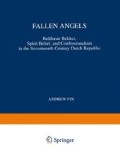Abstract
The earliest and most heated opposition to The World Bewitched came from the conservative, confessional wing of the Reformed church. Heirs of Gomarus and Voetius, these dogmatic Calvinists saw the Bekker controversy as an important battle in their campaign to protect the Reformed faith from the corrosive influences of Cartesian philosophy and the exegetical methods associated with it. The confessionalists targeted Bekker’s biblical exegesis for their harshest criticism, arguing that his figurative interpretation of scriptural passages dealing with spirits cast into doubt the veracity and authority of the entire Bible. They also attacked Bekker’s Cartesian ideas and charged that it was his allegiance to the new philosophy that led him into his exegetical errors. In their assault on Bekker’s ideas conservatives armed themselves with the biblical literalism that formed the intellectual foundation of Dutch Reformed confessionalism. Again and again they mustered biblical passages that they believed showed the devil’s power and the actions of spirits on bodies. Any attempt to interpret passages in a context larger than that provided by the words themselves was anathema to the confessionalists, and violent verbal assaults on Bekker often accompanied these arguments.
Access this chapter
Tax calculation will be finalised at checkout
Purchases are for personal use only
Preview
Unable to display preview. Download preview PDF.
Reference
D. Nauta, et. al. (eds.), Biografisch Lexicon voor de Geschiedenis van het Nederlandse Protestantisme (Kampen, 1983), 11, 256–257.
Everardus van der Hooght, Vierde Briev van Haggebher Philaleethees Geschreven aun zijnen Vriend N.N. Over het Weesen, Denken, Willen, Vermogen, ende de Plaats der Engelen, in het gemeen, ende der quade Geesten, in het byzonder. Item, van des menschen Ziele, en hare Werking, hetzij Afgesondert, ofte ook vereenighte met her Lichaam, ende hoe verre de quade geesten op de selve konnen werken (Amsterdam, 1691), 59–60.
J.P. de Bie, J. Loosjes, er. al., Biografisch Woordenhoek van Protestantsche Godgeleerden in Nederland (The Hague, 1903–1949), I, 615–618.
Henricus Brinck, De Godslasteringen van de Amsterdamsche Predikant Dr. Balthasar Bekker Ter Waarschouwing van alle Vroome in der Lande, Wederleyd In de Vorreden voor de Toet-Steen der Waarheid en der Meyningen (Utrecht, 1691), pp. 1–3.
Richard A. Watson, The Downfall of Cartesianism 1673–1712: A Study of Epistemological Issues in Late Seventeenth-Century Cartesianism (The Hague, 1966), 1–2.
Ibid., 49–64; Michael E. Hobart, Science and Religion in the Thought of Nicolas Malebranche (Chapel Hill, 1982 ), 122–125.
Arnold Geulincx, Van de hoofddeugden: De eerste tuchtverhandeling,ed. C. Verhoeven (Baam, 1986), 17–20.
D. Nauta, et. al.,eds., (Kampen, 1988), 151–154.
YHenricus Groenewegen, Pneumatica. offe leer van de Geesten, Zijnde Denkende en Redelijke Wesens, in Welk Bewesen word, dat de zelve Geesten, en wel hijsonder Engelen, zoo Goede als Quade, Oefenen dadelike werkingen, volgens huren natuur, op Lichamen (Enkhuizen, 1692), vol. III, 20–22.
Johannes Aalstius and Paulus Steenwinkel, Zedige Aanmerkingen waar in de Gronden en de daar op gebouwde redeneringen van de Wijtberoemden Heer Dr. Balth. Bekker, Nopende den Aard en Werkingen der Geesten aan Gods Woort en de Reden getoetst worden (Dordrecht, 1693), 151–159.
In a reply to Aalstius and Steenwinkel published in 1693, Bekker said that he had added a chapter between chapters VI and VII of book two in order to directly address the actions of spirits. See Balthasar Bekker, Brief van Balthasar Bekker S.T.D. en Predikant tot Amsterdam Aan twee eerwardige Predikanten, D. Joannes Aalstius tot Hoornaar Ende D. Paulus Steenwinkel tot Schelluinen Over derselver Zedige Aanmerkingen Op een deel des tweeden Boex van sijn Werk genaamd De Betoverde Weereld (Amsterdam, 1693 ), 6–7.
Balthasar Bekker, De Betoverde Weereld, Zynde een Grondig Onderzoek van ‘t gemeen gevoelen aangaande de Geesten, deselver Art en Vermogen, Bewind en Bedrijf als ook ‘t gene de Menschen door deselver kraght en gemeenschap doen (Amsterdam, Daniel van Dalen, 1691), II, 39–40.
bid., 38. Margaret Jacob, The Newtonians in the English Revolution (Ithaca, NY, 1976), 61–107.
Bekker, De Betoverde Weereld, II, 60–61, 64–65.
Bekker, Brief,7.
See Andrew Fix, “Hoe Cartesiaans was Balthasar Bekker?” It Beaken: Tydskrift fan de Fryske Akademy 58: 2–3 (1996), 118–135.
Willem Deurhoff and Willem van Blyenberg, Klaare en Beknopte Verhandeling van de Natuur en Werking der Menschelijke Zielen, Engelen en Duivelen (Amsterdam, 1692), 3–4.
Willem Deurhoff and Henricus Brinck, Vervolg van de Kloure en Beknopte Verhandeling van de Natuuren Werking der Menschelijke Zielen, Engelen en Duivelen (Amsterdam, 1693), 43–44.
Ibid., 7–8. Surprisingly, however, Brinck implied that Deurhoff himself did not hold these occasionalistic ideas. He claimed instead that Deurhoff recognized the absurdity of this position and therefore denied that angels and devils acted on things outside themselves. Brinck thus vented his anger toward Cartesianism by casting Deurhoff on the same side of the spirit controversy as Bekker.
Author information
Authors and Affiliations
Rights and permissions
Copyright information
© 1999 Springer Science+Business Media Dordrecht
About this chapter
Cite this chapter
Fix, A. (1999). Bekker’s Opponents: Confessionalism under Siege and Cartesianism in Crisis. In: Fallen Angels. International Archives of the History of Ideas / Archives Internationales D’Histoire des Idées, vol 165. Springer, Dordrecht. https://doi.org/10.1007/978-94-017-1531-7_5
Download citation
DOI: https://doi.org/10.1007/978-94-017-1531-7_5
Publisher Name: Springer, Dordrecht
Print ISBN: 978-90-481-5285-8
Online ISBN: 978-94-017-1531-7
eBook Packages: Springer Book Archive

